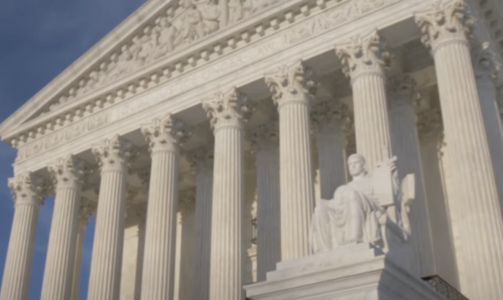Supreme Court takes up case involving birthright citizenship and executive powers
By
Veronica E.
- Replies 0
For many Americans, being born in the United States has long meant automatic citizenship.
It’s a principle rooted in the 14th Amendment to the Constitution—one that’s shaped generations of families and guided immigration policy for over 150 years.
But a recent executive order and a Supreme Court case are now prompting new legal questions about how that principle is applied.
As the Court weighs the matter, many families are watching closely, wondering what the outcome could mean for future generations.
Birthright citizenship refers to the legal policy that individuals born on US soil are considered American citizens, regardless of their parents’ immigration status.
This concept is based on the 14th Amendment, adopted in 1868, which was originally intended to guarantee citizenship to formerly enslaved people and their children.
The amendment states: “All persons born or naturalized in the United States, and subject to the jurisdiction thereof, are citizens of the United States.”
This has been the long-standing legal foundation for citizenship by birth in the US.

In January 2025, President Donald Trump issued an executive order stating that children born in the US to undocumented immigrants would no longer receive automatic citizenship.
The order was quickly challenged in court, and federal judges in multiple states issued injunctions to block it from taking effect.
The case has since moved to the Supreme Court—not specifically to rule on birthright citizenship itself, but to determine whether lower federal courts have the authority to issue nationwide injunctions on executive actions.
Much of the legal debate centers on how to interpret this phrase from the 14th Amendment.
Supporters of the executive order argue that individuals in the US without legal immigration status are not fully under US jurisdiction and therefore their children do not automatically qualify for citizenship.
Legal scholars and past court rulings, however, have largely maintained that most individuals born in the US are citizens.
The 1898 Supreme Court case United States v. Wong Kim Ark confirmed that a child born in the US to non-citizen parents—who were not diplomats or enemy soldiers—was a US citizen.
That ruling has guided the nation’s understanding of citizenship ever since.
If the executive order—or a future law with similar goals—were to take effect, it could create legal uncertainty for some children born in the US.
The most commonly raised concerns include:
Most legal experts agree that changing birthright citizenship would likely require a constitutional amendment—a process that demands support from two-thirds of Congress and three-fourths of the states.
The United States is one of the few countries that still grants unrestricted birthright citizenship, also known as jus soli, or “right of the soil.”
Other countries with similar policies include:
Many countries in Europe, including Germany and France, have moved to more limited systems where a child’s citizenship depends on their parents’ legal status or residency history.
The current Supreme Court case isn’t solely about who qualifies as a citizen—it’s about the scope of judicial power.
Specifically, whether lower courts can issue nationwide rulings that block executive orders.
The Court’s decision could have broader implications for how presidential powers are reviewed and challenged in court.
A timeline for the decision has not yet been announced.
As the Supreme Court considers this case, the outcome could shape how future citizenship policies are interpreted and enforced.
While nothing has changed yet, staying informed and understanding the broader legal conversation can help families prepare for what may lie ahead.
Read next: Trump’s first act in office could change everything – see what the Laken Riley Act is all about

Has your family navigated the US immigration system? Do you have opinions about how changes in policy could affect future generations? We invite you to share your experiences, thoughts, or questions in the comments below. The GrayVine community welcomes respectful discussion and shared understanding.
It’s a principle rooted in the 14th Amendment to the Constitution—one that’s shaped generations of families and guided immigration policy for over 150 years.
But a recent executive order and a Supreme Court case are now prompting new legal questions about how that principle is applied.
As the Court weighs the matter, many families are watching closely, wondering what the outcome could mean for future generations.
Birthright citizenship refers to the legal policy that individuals born on US soil are considered American citizens, regardless of their parents’ immigration status.
This concept is based on the 14th Amendment, adopted in 1868, which was originally intended to guarantee citizenship to formerly enslaved people and their children.
The amendment states: “All persons born or naturalized in the United States, and subject to the jurisdiction thereof, are citizens of the United States.”
This has been the long-standing legal foundation for citizenship by birth in the US.

A current Supreme Court case is examining legal questions related to citizenship and executive authority. Image Source: YouTube / ABC News.
The executive order and legal response
In January 2025, President Donald Trump issued an executive order stating that children born in the US to undocumented immigrants would no longer receive automatic citizenship.
The order was quickly challenged in court, and federal judges in multiple states issued injunctions to block it from taking effect.
The case has since moved to the Supreme Court—not specifically to rule on birthright citizenship itself, but to determine whether lower federal courts have the authority to issue nationwide injunctions on executive actions.
What does "subject to the jurisdiction thereof" mean?
Much of the legal debate centers on how to interpret this phrase from the 14th Amendment.
Supporters of the executive order argue that individuals in the US without legal immigration status are not fully under US jurisdiction and therefore their children do not automatically qualify for citizenship.
Legal scholars and past court rulings, however, have largely maintained that most individuals born in the US are citizens.
The 1898 Supreme Court case United States v. Wong Kim Ark confirmed that a child born in the US to non-citizen parents—who were not diplomats or enemy soldiers—was a US citizen.
That ruling has guided the nation’s understanding of citizenship ever since.
Also read: Could this court ruling change more than you think? Find out here
Possible implications of a policy shift
If the executive order—or a future law with similar goals—were to take effect, it could create legal uncertainty for some children born in the US.
The most commonly raised concerns include:
- Potential statelessness: Children might not automatically receive citizenship from the US or their parents’ country of origin.
- Limited access to services: Without recognized legal status, children could face challenges accessing education, healthcare, or employment.
- Family impact: Citizenship rules could affect families across generations, depending on how the laws are interpreted and enforced.
Most legal experts agree that changing birthright citizenship would likely require a constitutional amendment—a process that demands support from two-thirds of Congress and three-fourths of the states.
Also read: Legal expert analyzes challenges facing Trump's executive orders
How the US compares internationally
The United States is one of the few countries that still grants unrestricted birthright citizenship, also known as jus soli, or “right of the soil.”
Other countries with similar policies include:
- Canada
- Mexico
- Brazil
- Argentina
- Pakistan
- Jamaica
Many countries in Europe, including Germany and France, have moved to more limited systems where a child’s citizenship depends on their parents’ legal status or residency history.
Also read: Trump teases bold next move at high-energy Michigan rally—“we’re just getting started”
What the Supreme Court is deciding
The current Supreme Court case isn’t solely about who qualifies as a citizen—it’s about the scope of judicial power.
Specifically, whether lower courts can issue nationwide rulings that block executive orders.
The Court’s decision could have broader implications for how presidential powers are reviewed and challenged in court.
A timeline for the decision has not yet been announced.
What families can do now
- Stay informed: Changes to how citizenship is interpreted or enforced can happen through courts or future legislation.
- Check documentation: For families with recent immigration history, it may be helpful to review personal records and stay current with updates.
- Know the history: Understanding the legal background of birthright citizenship can help provide context for today’s legal discussions.
As the Supreme Court considers this case, the outcome could shape how future citizenship policies are interpreted and enforced.
While nothing has changed yet, staying informed and understanding the broader legal conversation can help families prepare for what may lie ahead.
Read next: Trump’s first act in office could change everything – see what the Laken Riley Act is all about
Key Takeaways
- The US Supreme Court is considering a challenge to nationwide injunctions that have blocked President Donald Trump’s executive order seeking to end birthright citizenship for children of undocumented immigrants.
- The 14th Amendment currently guarantees citizenship to all individuals born in the United States, with legal experts saying Trump’s interpretation contradicts long-established constitutional protections.
- The Supreme Court case is focused not on the citizenship status itself, but on whether lower courts have the authority to nationwide block presidential executive actions.
- Revoking birthright citizenship would likely require a constitutional amendment, and doing so could create a generation of stateless children, with no guarantee that other countries would accept them as citizens.
Has your family navigated the US immigration system? Do you have opinions about how changes in policy could affect future generations? We invite you to share your experiences, thoughts, or questions in the comments below. The GrayVine community welcomes respectful discussion and shared understanding.






